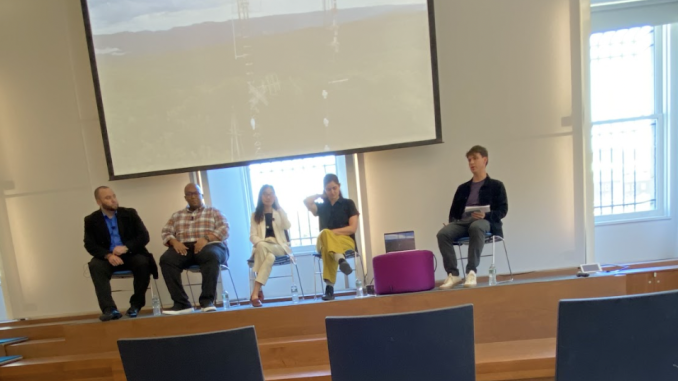
BY ANDRE RICKMAN
Technology has served to be a useful tool, but in some cases, the computing world can leave certain communities vulnerable to implicit biases.
This is where Columbia University stepped in with their event Computing &: A conversation series on computation and storytelling, which explored computation and intersectionality.
The event on April 21 was hosted by Columbia University’s director of media innovation, Mark Hansen, at Columbia’s Pulitzer Hall.
The panel acknowledged how computation can sometimes make at-risk communities have a target on their backs. Also, how in some scenarios, computing is needed to prepare for the ever changing world.
This sentiment was echoed by Martin Garcia, manager of News Inside, a project at The Marshall Project, who spoke on a panel about carceral technology.
“Internet Access is non-existent in prisons , the people that need the most access to these publications,” said Garcia. “There are roughly over 2 million people incarcerated in America, prison and jails are our biggest news deck for the Marshall Project.”
Guests were ecstatic to see this part of someone in the justice system trying to correct some technological wrongs of the prison system.
“Seeing amazing people like Martin Garcia, someone who was formerly incarcerated take this initiative to help better compute the post carceral plan is so amazing to me,” said Evelyn Gonzalez, an event attendee. “Having people like him be on the forefront along with his peers on these issues can give joy to people like us.”
“Technology is a useful servant but dangerous master” was shared throughout the panel, but in the narrative of how technology biases become prevalent, that statement holds merit.
Even within the access of criminal data, a bias is prevalent and race plays a factor. According to Boston University, a risk score is part of the convicted criminal sheet, for the judge’s assessment of when a crime is committed. The higher the score is, the more likely they will commit a crime. This score can harm people from marginalized communities.
According to this Boston University data, in 2021 – for every 100,000 adults, 1,186 Black adults were incarcerated in state or federal prisons, while just 222 white adults were.
The concept of technology and some developers gradually being aware of its implicit biases was confirmed by Hansen, who appreciated new efforts in computing and storytelling.
“As technology evolves we as its master should be finding ways to manipulate the algorithms and make sure everyone is included in the system,” said Hansen.
There was this underlying spark of joy when panelists discussed these initiatives to make sure computing for people who are or were incarcerated can access the tools to function in this world and combat those inherent biases.
At the end of the meeting, Garcia acknowledged the beauty of computation and what the future could be like.
“Being a part of these groups of amazing people in this sector of carceral technology is a beautiful thing to witness,” said Garcia.
Hansen echoed a similar message.
“The world of media is a beautiful thing in which I, as a media innovator, look into what makes media so special and to ensure security for everyone,” said Hansen.
